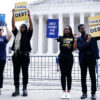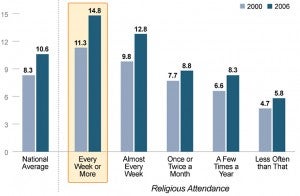A report recently released by the Bureau of Labor Statistics revealed that volunteerism in America is at a 10-year low.
This decline in civic engagement puzzled some commentators who noted that the downward trend wasn’t related to the greying of America, since the only age cohort with an increase in volunteering was the over-60 group. Nor was it connected to shorter periods of free time in an improved labor market, given that employed workers consistently volunteer at higher rates than unemployed peers.
But at least one cultural trend may help to explain the drop in volunteerism—a concurrent decline in religious practice throughout the past decade.
Sociological research has documented the relationship between church attendance and volunteerism, charitable giving, and civic involvement. Weekly churchgoers are more likely to volunteer and volunteer more often.
In addition, in a comprehensive study of charity in America, Who Really Cares, American Enterprise Institute president Arthur Brooks found that those who attend church weekly are more likely to donate money to a charitable cause than peers who seldom attend services, and they tend to give more—on average, nearly 3.5 times as much.
Given those findings, it is not surprising that a decline in religious practice would be accompanied by decreased levels of volunteerism in the nation.
Volunteerism and civic engagement can serve as a barometer for the strength of our civil society, and the generosity of America’s little platoons has comprised the essence of our nation’s character since its founding. To ensure that this vital role is fulfilled, support should be given to policies that protect the religious freedom of individuals and institutions to continue their unique contributions to civil society.



























